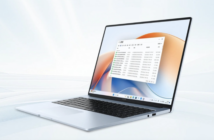Intel announced its latest line-up of mobile processors at the 2023 Consumer Electronics Show (CES) in Las Vegas, which succeed the company’s 12th-generation chipsets. Its new wave of 13th Gen Intel Core CPUs are tailored for various computing applications and usage such as productivity and gaming. Also revealed at CES was the company’s 13th Gen Intel Core H, P, and U-series chipsets, designed for lightweight laptops and IoT tech.
Additionally, the company also announced its new Intel N-Series processors, which are designed for use with entry-level and education laptops, to name a few. According to Michelle Johnston Holthaus, executive vice president and general manager of the Client Computing Group at Intel:
“The 13th Gen Intel Core mobile processor family delivers unrivaled, scalable performance for leadership platforms across all laptop segments. With our industry-leading technologies and unmatched global partner ecosystem, people can expect a high-caliber mobile experience in new and unique form factors, so they can game or create from anywhere.”
Intel Core H-Series
With the 13th Gen Intel Core H-series mobile processors, Intel boasts the first 24-core processor for a laptop. These are optimized to run in tandem with support for both DDR4 and DDR5 memory, as well as PCIe Gen 5 for optimal performance.
The H-series processors feature up to 5.6 gigahertz (GHz) turbo frequency, resulting in 11% faster single-thread performance and 49% faster multitask performance over the previous generation. The processors also include up to 24 cores (8 Performance-cores, 16 Efficient-cores), 32 threads and enhanced Intel Thread Director, full memory support of up to 128 gigabyte (GB) total for DDR5 (up to 5,600 megahertz) and DDR4 (up to 3,200 MHz), and Wi-Fi 6E (Gig+) for up to 6x faster internet speeds with no legacy Wi-Fi channel interference.
Additionally, there’s also built-in Intel Bluetooth LE Audio and Bluetooth 5.2, Thunderbolt 4 support, delivering transfer speeds up to 40 gigabits per second, PC connectivity to multiple 4K monitors and accessories, improved integrated graphics performance, as well as overclocking capabilities on all HX and HK SKUs.
Intel Core P-Series and U-Series
As for the 13th Gen Intel Core P-series and U-series, the latest mobile processors are designed for use in sleek and thin laptops. The chips come with up to 14 cores (6 Performance-cores, 8 Efficient-cores), an enhanced Intel Thread Director, Intel’s Iris Xe Graphics for gaming, XeSS Super Sampling, and Intel Arc Control.
The chips also come with Broad memory support for DDR5 and DDR4 and LP variants, Intel Wi-Fi 6E (Gig+) and new wireless features like Intel’s Connectivity Performance Suite, Wi-Fi Proximity Sensing and Bluetooth LE Audio, and up to four Thunderbolt 4 ports for convenience.
Intel N-Series
Intel also announced its N-series processors, which are set to replace the Intel Pentium and Intel Celeron product lines. Designed for education and IoT-segment products, the new chips come with cores built on the Intel 7 process technology, up to 28% better application performance and 64% better graphics performance versus previous generation processors.
The N-series processors also allow up to 10-hour HD video playback without recharging, support for AV1 decode, high-resolution display engine and improved IPU and MIPI camera support, Intel Wi-Fi 6E (Gig+) and Bluetooth 5.2 connectivity, and flexible memory (LPDDR5, DDR5/DDR4) and storage (UFS/SSD/eMMC) options.
Powerful Desktop Processing
With the new 13th Gen processors, Intel rounds out the 13th Gen desktop processor family that debuted alongside K-series SKUs back in September, which include new 35-watt and 65-watt SKUs focused on power efficiency and performance.
These include up to 5.6 GHz, 24 cores/32 threads, a larger L2 cache for up to 11% single-threaded and 34% multithreaded performance over 12th Gen Intel Core non-K processors, full forward and backward compatibility with 600 and 700-series motherboards, as well as support for both DDR5 and DDR4 memory, improved energy efficiency with Intel Dynamic Tuning Technology and better power scaling, which according to Intel can deliver greater performance per watt (PPW) than ever before.
More Intel Goodness
Intel adds that select hardware designs based on 13th Gen Intel Core processors will feature the Movidius vision processing unit (VPU), a result of collaboration with Microsoft on their new Windows Studio Effects. This means that AI heavy tasks required for professional-grade usage and streaming can be offloaded to the VPU, freeing the CPU and GPU for other workloads or multitasking.
As for IoT technologies, Intel says that its latest processors deliver new industrial features, extended temperature operations and higher performing CPUs, with more graphics capabilities and AI performance. This makes them ideal for use in fields like retail, education, healthcare, aerospace, industrial applications, and more.
Meanwhile, the company has engineered its Intel Evo hardware for laptops, which feature tech including Intel’s Connectivity Performance Suite and Intel Bluetooth LE Audio, Intel Unison software for multi-device connectivity, as well as improved battery life and overall performance.
With all that said, Intel’s new wave of products are certainly promising, and it will definitely be interesting to see how these advance mobile computing tech as we know it.





1 Comment
Pingback: Blazing Fast: Intel Announces its 13th Gen Core i9-13900KS Processor